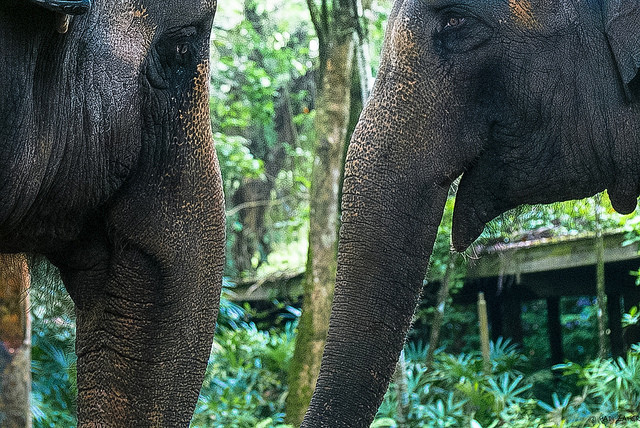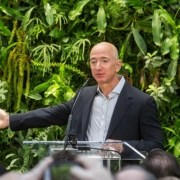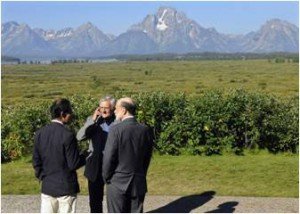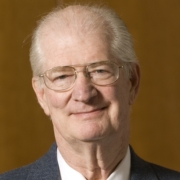Are We Hard-Wired to Think We Can Grow Forever?
by James Magnus-Johnston

Humanity is an irrational lot, prone to denial and short-termism. If rational arguments were primary catalysts for social change, perhaps a steady state economy would already be a reality. Research in behavioural economics and cognitive psychology is beginning to help us understand why human beings don’t always make decisions that are in their best interests. Can we overcome our irrational, maladapted mental hard-wiring to thrive in a post-growth future?
Trailblazing behavioural economists like Daniel Kahneman have discovered that human beings are highly irrational creatures prone to delusion, cynicism, and short-termism. In ecological economics, Bill Rees has argued that our mental genetic presets have hard-wired us for overconsumption and ecological doom. And now, according to a new theory by Ajit Varki and Danny Brower, perhaps it all stems from an overarching psychological predisposition to denial.
In ecological terms, denial might be characterized as the failure to accept the deleterious consequences of economic growth in favour of accepting comfortable fictions that reinforce the status quo. Head-scratching environmentalists often use the word “denial” to reference the irrational “climate change deniers,” who accept the science of familiar things like internal combustion engines, modern appliances, or GDP growth, yet are dismissive of climate science and planetary boundaries. Why are human beings so good at denial?
Ecological economist Bill Rees argues that our ancient “triune” brain is hard-wired for short-term rewards, and those rewards have been amplified by the abundance of our fossil fuel driven economy. Our brain, which runs on an outdated OS, has leveraged its propensity for denial to construct a myth of perpetual growth wherein we can grow the economy and achieve short-term rewards forever.

Is it our ability to deny reality that separates us from other highly intelligent animals? Photo Credit: Hadi Zaher
In Denial: Self-Deception, False Beliefs, and the Origins of the Human Mind, Varki and Brower take it one step further. They argue that while our intelligence and use of tools set human beings apart from the rest of the animal kingdom, our capacity for denial may be the greatest differentiating factor. The late Danny Brower asked Varki, a biologist, why other smart, self-aware animals such as elephants, apes, dolphins, whales, or magpies, had not achieved levels of intelligence seen in human beings. Many of these animals can recognize themselves, communicate with one another, and mourn relatives or companions. They have all had more time on Earth to evolve.
The theoretical, though as yet unverifiable, answer put forward by Varki and Brower revolves around two things: (1) that human beings are aware of the thoughts of others, and (2) that they have ability to deny reality. According to them, denial is the essence of what it means to be human! They argue that as human beings became aware of their mortality, some fell into depression while others were able to carry on without becoming crippled by this realization. Mind-over-reality became our defining characteristic, enabling us to maintain sanity in the face of danger. Those who suffer from depression are often more aware of reality, they note, which in turn can cause crippling anxieties. On a society-wide basis, such anxiety can cause an avoidance of procreation, which would be an evolutionary dead-end.
But in the Anthropocene, have the tables turned? Now, reality-accepting behaviour may be an evolutionary boon. Rather than leading to a dead-end, accepting the reality of overconsumption and overpopulation may result in actions that increase the likelihood of human survival. Could it be that those who accept reality have suddenly become cultural (r)evolutionaries better adapted for long-term human survival? Can the shift happen quickly enough to improve our survival prospects?
Perhaps the very evolutionary mechanism which led to our propensity for denial may also temper our unfortunate inclinations. At the point when human beings theoretically developed a capacity for denial, we would have changed the cultural software on our mental hardware, which demonstrates that change is possible. We are capable of changing the way we interact with reality.
Although if one does not accept the premise that we can change our cultural software quickly enough, Varki and Brower point out that reality-denial also leads to optimism, confidence, and courage in the face of long odds–a “can do” attitude. If we can’t accept reality, maybe we can focus instead on denying the current economic “reality” of growth!
Dr. Varki calls for us to temper our denial in order to avoid climate destabilization. Most types of denial, he says–about high national debt loads, eating too much red meat, smoking cigarettes, or refusing to wear seatbelts–aren’t fatal to the entire species. Climate destabilization, like a nuclear holocaust, is a different matter. A shift towards reality-accepting behaviour would help us see the validity of policy prescriptions like reducing the debt load and living within planetary constraints.
More often than not, post-growth thinkers are using rational arguments among a very irrational lot. While rational arguments are certainly necessary, we also need to work on how to ‘nudge’ individuals and communities towards a steady state economy with a pitch that leverages or mutes our irrational operating system. In the meantime, let’s harness our optimism, confidence, and courage in the face of long odds.








The Judo-Christian Bible has also this to say:
‘Let no one deceive himself. If anyone among you thinks that he is wise in this age, let him become a fool that he may become wise. For the wisdom of this world is foolishness with God. For it is written, He catches the wise in their own craftiness.’
The number of ways symptoms of sin can surface is infinite and reason (human wisdom, by some referred to as Darwinism) will not suffice to win the battle. Nudging won’t do.
From the article: “Now, reality-accepting behaviour may be an evolutionary boon. Rather than leading to a dead-end, accepting the reality of overconsumption and overpopulation may result in actions that increase the likelihood of human survival. Could it be that those who accept reality have suddenly become cultural (r)evolutionaries better adapted for long-term human survival? Can the shift happen quickly enough to improve our survival prospects?”
The answer is YES, cultural revolutionaries improve their survival prospects. This is one of the lessons of the 1960’s. As I say quite often, “Them dirty hippies was right.”
From my first book (The Laws of Physcis Are On My Side, 2014:14): “As I said, the process of culture change is too slow for a rapidly changing environment and this is the ultimate argument against determinism. Going along with the rest of the group while making small changes is progressive and safe. However, if the group is rushing headlong to catastrophe, going along with the group is not only difficult, but suicidal. This is the real lesson of the 1960’s. The world was changing fast. While the US government pursued a war in Vietnam, decimating the social fabric and ruining the national economy, many of us could see the cliff we were approaching. If some of us had not stood up and said “NO!” it is likely we would have fallen prey to nuclear annihilation well before 1975, when the Vietnam War finally ended and the world breathed a little easier. This time, “going along to get along” and incorporating nominal cultural changes while accepting one’s place in the group (as modern “progressives” still do) was suicidal. This is where the primacy of the individual became critical in developing a political and cultural philosophy. Mainstream culture could not adapt. The group failed. The individuals survived.”
That’s a blanket statement and obviously lots of people get it. Neuroplasticity is a recent discovery in neuroscience and people are not so hard-wired. However, there are clear differences in our hemispheric functioning of the brain. Left-hemisphere thinking is more associated with looking at the parts and right-hemisphere for looking at the whole. This allows us to be able to pay two kinds of attention to our world at the same time, and yet over time we have gone more to a left-hemisphere view, this has made religion more about certainty, but much of the problem steams from the way we are taught, and that in part is because of science. We love certainty, but quantum physics changed our view on certainty. That’s not to say that climate change isn’t real or that humans are not causing it. But many people have embraced deterministic frames, science itself is based on many forms of deterministic and mechanistic thinking. It was the Enlightenment thinking after all that brought us capitalism, Enlightenment thinking won’t get us out of this though. The endgame is the technological singularity. Science abandoned the animate universe in the 19th century with materialism. But materialism has not figured everything out. There is the hard problem of consciousness, the missing heritability problem, etc. Even rationalism has its limits. As Iain McGilchrist says the same kind of thinking that works in the court room, doesn’t work in the bedroom. And lots of things in life you don’t get by trying. The harder you try to go to sleep, the less you can. We have twisted views on rationalism because of Enlightenment thinking too, as eminent neuroscientist António Damásio says “We usually conceive of emotion as a supernumerary mental faculty, an unsolicited nature-ordained accompaniment to our rational thinking. If emotion is pleasant, we enjoy it as a luxury; if it is painful, we suffer it as an unwelcome intrusion. In either case, the sage will advise us, we should experience emotion and feeling in only judicious amounts. We should be reasonable. There is much wisdom in this widely held belief, and I will not deny that uncontrolled or misdirected emotion can be a major source of irrational behavior. Nor will I deny that seemingly normal reason can be disturbed by subtle biases rooted in emotion… Nonetheless, what the traditional account leaves out is this: Reduction in emotion may constitute an equally important source of irrational behavior.” We need an Enlightenment of the Enlightenment…
This post seems to focus too much on the denialism of individuals and overlooks the bigger issue. Our species has achieved competitive advantage in the wisdom of the elders. We have nourish the old among us and we have benefited from their wisdom. Our social and religious structures have been part of our competitive advantage.
This has worked in the context of there being a relative abundance of resources. Now this competition for natural resources is becoming our downfall. We don’t have the leadership, ethics and social structures needed to address the current situation.
We don’t have the mentors and models of change that are needed. If we did, we would be employing them. We need to use our creative intelligence and our denial of the odds to find ways to bring leaders together that will change the direction of society.
I believe that it is crucial that the people who are currently aware of the impending crises to take a step backwards and evaluate whether their campaigns on individual issues are adequate to bring about the cultural changes needed (which clearly they are not) and pull together to invent the new directions involving a complete revision of our political structure away from charismatic individuals with their mental health abnormalities to a process of informed decision making that sets priorities based on objective criteria and agreed principles.
Complaining without being prepared to address the political structure is futile.
I am not sure if denial is the right word for what is happening. Not that denial isn’t rampant. There are five natural factors that determine and will continue to determine our history and future.
* All life reproduces to the maximum their environment
allows(population density).
* All life will use all the resources in its environment to promote its
present living (population pressure).
* Much of life manifest an us against them protectionism (even plants
release poisons to the soil to protect their territory. This is the convergence
of territoriality (which is manifest by all life) and the need to belong for
this dependently social animal called human.
* We are immersed in an environment of our own making and our
“brilliance” threatens us with unintended consequences (whether
agriculture or nuclear power).
* Groups larger than the small group of 30 to 200 people,
which is the social environment in which we evolved for a million years,
creates power-over and inequality.
These five factors are a natural part of life and being human. For more detailed exposition:
http://sunweber.blogspot.com/2…
I agree that “nudging” won’t do it & that we are hard wired to ignore certain realities.
However, we only ignore realities we see as unpleasant – so what if there was another possible reality that didn’t involve self sacrifice?
Wisdom literature says the way forward is love, and that we must prioritise for the poor. What if we could see more clearly a way that could work for us all?
The biggest problem is that the billions who are looking for an escape from poverty will follow in our climate destroying, war mongering footsteps. What if we could show another more realistic way for OUR poor to progress into an attractive (AND SUSTAINABLE) life? Such an option would even help those average western consumers to relax about their fearful obsession with eating drinking & being “merry”.
see http://ntw.net46.net/NTWmodel/NTWModeloverview.htm
Chris Baulman
@landrights4ll